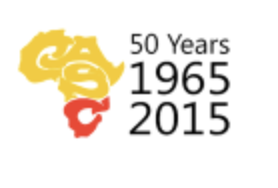Cambridge Centre for African Studies
University of Cambridge

The Cambridge Centre of African Studies was founded in 1965 by pathbreaking anthropologist Audrey Richards, who came to Cambridge from Makerere University, Uganda. The Centre was established with support from the University Grants Committee with the aim of expanding interdisciplinary research and teaching on Africa on the area studies centre model. It was developed to provide a locus for Africa-related research throughout the University, whether in the social sciences, humanities or natural and biological sciences. Today, the Centre is a world-class institution, home to a thriving community of Cambridge students and scholars who work together with the Centre’s staff and postdoctoral fellows as well as with significant numbers of visiting students and scholars, many from African universities.
Over the decades, the Centre has had a host of distinguished directors and members and has launched some of the most important debates and intellectual developments in the study of Africa. While African Studies at Cambridge has been best known for the work undertaken in African history and social anthropology, these strengths have recently been complemented by growth in African politics, the study of Christianity in Africa, African intellectual history, and African political ecology.
The Centre’s primary role in the University is to undertake, promote, and support research and teaching about Africa as well as to build academic engagement with African scholars and institutions. Among the ways we do this is through intensive and dynamic seminar series, workshops, public lectures, and conferences, as well as through our support to a diverse array of student and faculty initiatives, from the Black Cantabs, to the Decolonising the Curriculum Faculty Research Group, to the Cambridge Africa Film Festival. Our African Studies Library, located within the Centre, is a home for PhD students from across the university as well as for our own MPhil students and visiting researchers working on our specialized collection or archives. For fifty years now, we have been forging a community of scholars, students and visitors interested in Africa at Cambridge, creating an environment for the study of Africa to thrive and move forward. Collaboration with universities, scholars, and civil society in Africa has long been key to the Centre’s work, from its founding director Audrey Richards’s contribution to the establishment of social sciences in Uganda to a range of more recent forms of partnership, including our novel visiting fellows programme. Building this engagement is the centerpiece of our work for coming years, as we undertake a multifaceted programme to reorient African studies at Cambridge towards the debates, institutions, scholarship, and scholars in the continent.
The Centre is housed on the third floor of the Alison Richard Building (ARB) on the University’s Sidgwick Site, which is the main base for humanities and social science teaching and research in Cambridge. This location means that CAS is at the heart of a cosmopolitan academic community that also contains the renowned interdisciplinary Centre for Research in the Arts, Social Sciences and Humanities (CRASSH), the Department of Politics and International Studies (POLIS) as well as the Centres of Latin American Studies, South Asian Studies, Development Studies, Gender Studies and the Centre of Governance and Human Rights (CGHR). This stimulating intellectual and social environment presents many opportunities for developing new research initiatives and academic networks, in particular around the newly established Consortium for the Interdisciplinary Study of the Global South.